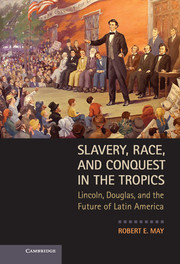Book contents
2 - Antilles to Isthmus
Published online by Cambridge University Press: 05 June 2014
Summary
Stephen Douglas’s historical fame before his Kansas-Nebraska Act of 1854 rests largely on his role as chair of the Senate Committee on Territories in navigating through Congress the “Compromise of 1850,” a group of separate laws that possibly staved off civil war over slavery for a decade. They included a new fugitive slave measure, a ban on slave trading in the federal district, federal funding of Texan bonds from Texas’s days as an independent republic, and a resolution of territorial issues arising from the recent war with Mexico. The compromise set aside both the Wilmot Proviso and previous proposals by many national figures, including Douglas, to extend the 36º30' line to the Pacific Ocean, as well as recent southern demands that slavery be legalized in all U.S. territories. Instead, the settlement allowed California outright admission to the Union as a free state (bypassing disputes over whether slavery would be permitted during California’s territorial phase), resolved Texas’s boundary issues, and wrought the territories of New Mexico and Utah from the remainder of Mexico’s cession.
The laws about New Mexico and Utah, precedents for Douglas’s highly controversial later stance on slavery in Kansas, provided the new territories could eventually become states “with or without slavery, as their constitution may prescribe at the time of their admission.” While the Mexican War was in progress, Lewis Cass had championed a formula originated by New York senator Daniel Dickinson to avert congressional disputes over slavery’s extension by letting territorial residents “in their respective local governments” decide the question themselves. By applying the Dickinson-Cass solution to New Mexico and Utah, Douglas adopted “popular sovereignty” as a quintessentially American democratic solution (and thus theoretically inoffensive in either North or South) to the dangerous territorial dispute. Virtually all U.S. politicians believed at least theoretically in self-government by the vote of white males.
- Type
- Chapter
- Information
- Slavery, Race, and Conquest in the TropicsLincoln, Douglas, and the Future of Latin America, pp. 57 - 103Publisher: Cambridge University PressPrint publication year: 2013



